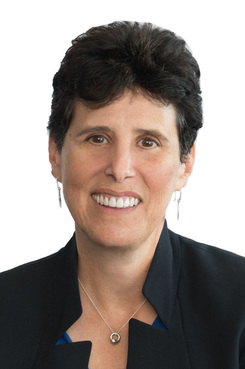Veteran DC Whistleblower Lawyer Says She Reps 'Good Guy' in Weinstein Scandal
Debra Katz, counsel to longtime Weinstein executive, calls sex scandal a "tipping point."
October 12, 2017 at 12:48 PM
6 minute read
 Harvey Weinstein
Harvey Weinstein
As Harvey Weinstein became engulfed in scandal over allegations of sexual harassment, Washington-based whistleblower lawyer Debra Katz found herself representing a longtime executive who reportedly had confronted the influential Hollywood producer about his alleged misconduct.
Katz of Washington's Katz, Marshall & Banks is counsel to Irwin Reiter, a longtime Weinstein Co. executive who, according to a report in The New Yorker this week, objected to Weinstein's alleged harassment of a temporary front-desk assistant named Emily Nestor. Twenty-five at the time, Nestor, a law school graduate, recounted what she described as “textbook sexual harassment” that included inappropriate comments about her appearance and Weinstein's alleged boasts of sexual relations with actresses.
In a brief phone interview and in emails Wednesday, Katz, who was first identified in The New Yorker article as representing Reiter, said scandals such as the Weinstein saga “shine a spotlight on egregious sexual harassment, which goes on in companies across the country every single day.”
 Debra Katz
Debra KatzKatz declined to talk in any detail about her work for Reiter, including when she was first contacted. She said she was “gratified” to be advising Reiter, who reportedly had worked for Weinstein for 30 years.
Messages to Reiter's company email account and to LinkedIn were not immediately returned Wednesday.
“Hopefully, this case will provide a tipping point and will empower women to come forward when they suffer sexual harassment and encourage men to object to this unlawful treatment of their coworkers,” Katz told The National Law Journal. “This behavior is despicable and has to stop. I'm gratified to play the role I am playing in this case advising a male executive who had the courage to object to such behavior.”
Reiter, according to The New Yorker's report, messaged the female assistant to apologize for how Weinstein allegedly treated her on her first day. “We view this very seriously and I personally am very sorry your first day was like this,” Reiter wrote in a LinkedIn message, the authenticity of which Katz confirmed for the magazine. “Also if there are further unwanted advances, please let us know.”
In 2016, just before the presidential election, Reiter, according to The New Yorker, messaged Nestor again to say, “All this Trump stuff made me think of you,” and added that he had “fought” Weinstein over his treatment of women three weeks before the incident involving the desk assistant. “I even wrote him an email that got me labelled by him as sex police,” Reiter wrote, according to the magazine report. “The fight I had with him about you was epic. I told him if you were my daughter he would have not made out so well.”
'A Key Witness in a Major Scandal'
Asked about how she came to have a role in the unfolding Weinstein scandal, Katz said her practice involves representing not only whistleblowers and victims of harassment but also those who stand up for others who have suffered from alleged misconduct.
“The fact is, my practice is broader than whistleblower law. I'm often retained to represent individuals who have knowledge of discrimination, sexual harassment, fraud, waste and abuse and are witnesses to illegal practices. Or they themselves may have objected to such practices. These individuals reasonably fear retaliation and need assistance navigating internal investigations, press inquiries and the like. Most individuals thrust into the kind of situation that Mr. Reiter is now—he's a key witness in a major scandal—retain counsel,” Katz said.
“It was reasonable for him to retain counsel given that he was being thrust into this major scandal,” she added. “In fact, he is the good guy here.”
For two decades, rumors of sexual harassment and assault followed Weinstein as he claimed Academy Awards and built himself into one of the most influential figures in Hollywood, according to an Oct. 5 investigative report by The New York Times. With that clout came the power to intimidate victims into silence—through nondisclosure agreements, threats to sue and, in many cases, an unspoken understanding that he could make or break careers, according to the paper.
Weinstein had assembled a powerhouse legal team in the buildup to The New Yorker article and the New York Times investigation.
Through the storm, Weinstein's longtime lawyer, David Boies, chairman of Boies Schiller Flexner, has kept the producer on as a client. Although that relationship could be tested if litigation erupts between Weinstein and his former company, which is also a client of Boies' firm. On Saturday, the noted plaintiffs lawyer Lisa Bloom, a women's rights advocate who had been advising Weinstein, stepped down from his legal team.
Blair Berk, a West Hollywood lawyer who has represented entertainment stars, has joined the Weinstein team, The Hollywood Reporter said Wednesday.
Weinstein's statement in response to The New Yorker piece stated: “Any allegations of nonconsensual sex are unequivocally denied by Mr. Weinstein. Mr. Weinstein has further confirmed that there were never any acts of retaliation against any women for refusing his advances.”
Weinstein's namesake production company fired him Sunday. The company has also enlisted Debevoise & Plimpton partner John Kiernan for an independent investigation into the sexual harassment allegations.
Katz said Wednesday that her client wants to cooperate with that investigation.
“When the public thinks about whistleblowers, they tend to peg these individuals as having expressed concerns about fraud, waste, abuse, safety issues, financial improprieties, and the like. And certainly there is a well-established set of laws that protect individuals from retaliation for raising those types of concerns,” Katz said.
She continued: “But the law also protects individuals who expose or object to illegal activity, such as sexual harassment. People who are willing to stick their necks out and support others in objecting to sexual harassment or other unlawful employment practices are also entitled to legal protection. I represent those individuals as well. In representing them, it's my job to ensure that they face no retaliation for having done the right thing.”
This content has been archived. It is available through our partners, LexisNexis® and Bloomberg Law.
To view this content, please continue to their sites.
Not a Lexis Subscriber?
Subscribe Now
Not a Bloomberg Law Subscriber?
Subscribe Now
NOT FOR REPRINT
© 2025 ALM Global, LLC, All Rights Reserved. Request academic re-use from www.copyright.com. All other uses, submit a request to [email protected]. For more information visit Asset & Logo Licensing.
You Might Like
View All
‘Ripe for SCOTUS’: Ruling Creates Circuit Split on NLRB’s Expanded Monetary Remedies

Trump Administration Faces Legal Challenge Over EO Impacting Federal Workers
3 minute read
Three Akin Sports Lawyers Jump to Employment Firm Littler Mendelson

High Court Rejects 'Heightened' Standard for Employers Defending FLSA Cases
Trending Stories
- 1New York-Based Skadden Team Joins White & Case Group in Mexico City for Citigroup Demerger
- 2No Two Wildfires Alike: Lawyers Take Different Legal Strategies in California
- 3Poop-Themed Dog Toy OK as Parody, but Still Tarnished Jack Daniel’s Brand, Court Says
- 4Meet the New President of NY's Association of Trial Court Jurists
- 5Lawyers' Phones Are Ringing: What Should Employers Do If ICE Raids Their Business?
Who Got The Work
J. Brugh Lower of Gibbons has entered an appearance for industrial equipment supplier Devco Corporation in a pending trademark infringement lawsuit. The suit, accusing the defendant of selling knock-off Graco products, was filed Dec. 18 in New Jersey District Court by Rivkin Radler on behalf of Graco Inc. and Graco Minnesota. The case, assigned to U.S. District Judge Zahid N. Quraishi, is 3:24-cv-11294, Graco Inc. et al v. Devco Corporation.
Who Got The Work
Rebecca Maller-Stein and Kent A. Yalowitz of Arnold & Porter Kaye Scholer have entered their appearances for Hanaco Venture Capital and its executives, Lior Prosor and David Frankel, in a pending securities lawsuit. The action, filed on Dec. 24 in New York Southern District Court by Zell, Aron & Co. on behalf of Goldeneye Advisors, accuses the defendants of negligently and fraudulently managing the plaintiff's $1 million investment. The case, assigned to U.S. District Judge Vernon S. Broderick, is 1:24-cv-09918, Goldeneye Advisors, LLC v. Hanaco Venture Capital, Ltd. et al.
Who Got The Work
Attorneys from A&O Shearman has stepped in as defense counsel for Toronto-Dominion Bank and other defendants in a pending securities class action. The suit, filed Dec. 11 in New York Southern District Court by Bleichmar Fonti & Auld, accuses the defendants of concealing the bank's 'pervasive' deficiencies in regards to its compliance with the Bank Secrecy Act and the quality of its anti-money laundering controls. The case, assigned to U.S. District Judge Arun Subramanian, is 1:24-cv-09445, Gonzalez v. The Toronto-Dominion Bank et al.
Who Got The Work
Crown Castle International, a Pennsylvania company providing shared communications infrastructure, has turned to Luke D. Wolf of Gordon Rees Scully Mansukhani to fend off a pending breach-of-contract lawsuit. The court action, filed Nov. 25 in Michigan Eastern District Court by Hooper Hathaway PC on behalf of The Town Residences LLC, accuses Crown Castle of failing to transfer approximately $30,000 in utility payments from T-Mobile in breach of a roof-top lease and assignment agreement. The case, assigned to U.S. District Judge Susan K. Declercq, is 2:24-cv-13131, The Town Residences LLC v. T-Mobile US, Inc. et al.
Who Got The Work
Wilfred P. Coronato and Daniel M. Schwartz of McCarter & English have stepped in as defense counsel to Electrolux Home Products Inc. in a pending product liability lawsuit. The court action, filed Nov. 26 in New York Eastern District Court by Poulos Lopiccolo PC and Nagel Rice LLP on behalf of David Stern, alleges that the defendant's refrigerators’ drawers and shelving repeatedly break and fall apart within months after purchase. The case, assigned to U.S. District Judge Joan M. Azrack, is 2:24-cv-08204, Stern v. Electrolux Home Products, Inc.
Featured Firms
Law Offices of Gary Martin Hays & Associates, P.C.
(470) 294-1674
Law Offices of Mark E. Salomone
(857) 444-6468
Smith & Hassler
(713) 739-1250








